Commentary
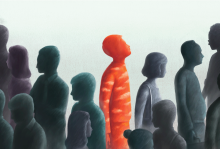
DOES IT EVER seem that you’re cultivating your worst self instead of your best? We are still a far cry from what Catholic Worker co-founder Peter Maurin called “a society in which it is easier for people to be good.” Every day we face hard moral choices. Social media and the broader culture foster entitlement, grievances, tit-for-tats, snap judgments, and hurtful words. The global economy entangles our purchases to injustice somewhere. We are constantly in fragile, guilty, fearful, and wounded states that lead to lashing out and reacting badly. So, how do we live principled and faithful lives within sinful systems? Our Christian tradition provides tools to maintain a sense of integrity.
When a person finds it impossible to make decisions according to their conscience, they sustain a “moral injury.” Such injuries result when we are unable to align how we live with who we believe ourselves to be. For most of us, these injuries are small (compared to those in violent situations), but they add up. We may look at injustice in the world and spiral into thoughts such as, “I’m not doing enough,” “I’m part of the problem,” “I’ve got no right to complain,” or even “Why can’t I remember to bring a frickin’ container for leftovers when I go out to eat?” Our inner critic works overtime — and has plenty of material. These self-criticisms can define how you see yourself. Getting a handle on them with mercy — recognizing and assessing them honestly — is key to spiritual resilience.

YOU NO DOUBT have heard about the history-making criminal indictment of former President Donald Trump and several allies for their efforts to overturn the 2020 election in Georgia. The indictment used a state statute intended to address organized crime. In the case against Trump, the state is defending the democratic electoral process against an organized criminal conspiracy. But in another recent case, this same Georgia statute is being wielded in a manner that weakens democracy and could lead to a catastrophic loss of First Amendment rights.
The Racketeer Influenced and Corrupt Organizations (RICO) Act, while designed to dismantle organized crime groups, has too often been transformed into a government tool to suppress protest and thwart the principles of free speech and assembly, rights secured in the U.S. Constitution. Broadly speaking, RICO statutes (both federal and those adopted by most states) make three things illegal: First, for any person to acquire assets by engaging in a pattern of criminal activities (“racketeering”). Second, for any person employed by or associated with such an enterprise to conduct or participate in, directly or indirectly, such enterprise through a pattern of those activities. Third, for any person to commit any “overt act” of planning, preparing, or attempting to commit the behaviors described in the previous two situations with one or more people.
The reason these laws are so effective in taking down organized crime enterprises, such as some prominent Mafia crime families, is the same reason it is dangerous to free speech: It criminalizes indirect participation in criminal acts, including taking any step that could be perceived as preparing to break a law (the slippery slope of “precrime”). Since its adoption in the 1970s, RICO has been used in attempts to criminalize support of political protest organizations including PETA, Greenpeace, and Black Lives Matter.

AMONG TECHNOLOGICAL INNOVATIONS today, perhaps none is imbued with more hope—or more hype—than artificial intelligence (AI). Its proponents, such as billionaire technologist Marc Andreessen, claim it will literally “save” the world. Critics (see Kate Crawford’s Atlas of AI ) claim it is, in many ways, built on misunderstanding, exploitation, and deceit. But nearly everyone agrees that AI is a powerful tool that presents us with profound, and profoundly moral, challenges.
While Christianity offers a wealth of wisdom concerning moral and ethical behavior, materialist perspectives (a philosophy in which all facts are reducible to physical processes), which function as “articles of faith” in modern technical circles, have become the acceptable rhetorical scaffolding for “ethical” AI. For many, materialist perspectives deny the existence of God and any idea of eternal consequences but seek to compel people—and their technologies—to behave ethically, nonetheless.
While a strongly worded what is a good start, only a robust why can compel humans to want to be good, and only a robust how can enable them to do so. This is where materialism begins to falter, and Christianity can enter the debate with authority. The Christian faith acknowledges God as the originator, motivator, and sustainer of righteousness, asserting that moral behavior is the fruit, not the root, of a righteous life. It challenges us to look beyond a humanistic idea of ethics and toward a creative and abundant notion of goodness that cannot be accomplished by our own will or power. As AI has grown increasingly powerful and we have seen a proliferation of applications, particularly with large language models achieving nearly “human-level” performance, some tech leaders, perhaps sensing the difficulty of controlling their own creations, have called for “a pause on giant AI experiments.” Academic literature is rife with serious concerns on racism in AI development, theft of creative content, development of autonomous weapons, and more. At least one tech leader, Microsoft’s Brad Smith, perhaps mindful that AI ethics is too heavy a lift for technologists alone, has invited religious voices into the conversation.
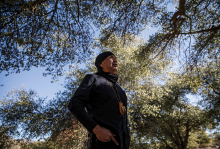
LONG-DISTANCE RUNNING has long been part of Apache traditional lifeways. For Wendsler Nosie Sr., it is a core expression of prayer and communion with the Earth.
In October 1990, the then 31-year-old tribal chair of the San Carlos Apache Reservation ran more than 60 miles in two days as prayerful resistance to the destruction of sacred sites at Mount Graham in Arizona. Two years earlier, Sen. John McCain had turned over Mount Graham to the University of Arizona to install telescopes. Nosie’s prayer run was part of a wider Apache and environmentalist movement to stop destruction of the mountain for the observatory project.
Nosie also was promoting a revival of his traditional Apache spirituality. The prayer run helped him “realize so much about our identity, where we originated and the sacredness of what makes us who we are.” Nosie went on to establish Apaches for Cultural Preservation and the Spirit of Mountain Runners, hosting twice-yearly community prayer runs. Grounded in ceremony, these runs begin at the site of the prison camp where the U.S. Army held Nosie’s ancestors in the 1890s. The destination of the summer run is Mount Graham; in winter, it is Oak Flat, another sacred site.
Oak Flat (Chi’chil Biłdagoteel) is a high desert valley in the mountains east of Phoenix, roughly 2,400 acres of federal land in Tonto National Forest that is sacred to Native Americans. Its fresh springs nurture oaks, making it a traditional acorn-gathering site for the Apache, and its canyons are lush with medicinal plants. The Apache have held ceremonies here for centuries. Nosie speaks reverently about Oak Flat as a place where his people have conversations with angels.

IN 2016, our church in San Salvador was preparing to host a group of young adults on a “mission trip” from the United States. Just prior to their travel, the U.S. government suspended the Peace Corps program in El Salvador due to security concerns related to gang violence. As the host church, we decided the mission trip should be canceled too. In 2015, the murder rate in my country peaked at 103 per 100,000, making it the most dangerous country in the world.
Over the last seven years, El Salvador has seen a rapid drop in its murder rate. In early 2023, President Nayib Bukele claimed that the country had accumulated 365 nonconsecutive days with zero homicides since he took office in June 2019. While it’s impossible to independently corroborate Bukele’s claim, it’s undeniable that Salvadorans are experiencing a new sense of safety and “peace.” That sense of peace, however, has come at a grave cost.
As of January 2023, El Salvador had the highest incarceration rate in the world. Approximately 61,000 people, including 1,082 minors, have been swept up in mass arrests since March 2022, when congress allowed Bukele to suspend constitutional rights. Salvadorans no longer have rights to free assembly, due process, access to lawyers, and previously protected freedoms. Nearly two percent of the Salvadoran adult population is in prison in conditions that fail to meet the U.N.’s minimum standards for imprisonment. Cristosal, a civil society human rights organization in El Salvador, has documented the death of 153 prisoners in state custody between March 2022 and March 2023, all detained during the same period. Of those, 29 died violent deaths and 46 “probable violent deaths” or under “suspicions of criminality,” reported Cristosal. More reports continue to roll in of the deaths of incarcerated people who also show signs of torture.

IN THE VAST and often overlooked landscapes of rural America, families face unique challenges. One critical issue stands out: the child care crisis. Our family-run produce farm in Ohio has been in production for 28 years. With three generations working to create a viable business to support our growing family, we know something about the need for child care in rural areas. The 2023 U.S. Farm Bill presents a crucial opportunity to address this pressing issue and foster early childhood development in rural communities.
The child care crisis is not unique to rural America, but rural Americans are more impacted by the lack of access to licensed child care. For example, 59 percent of rural communities are “child care deserts” compared to 56 percent of urban and 44 percent of suburban communities, according to a 2018 report by the Center for American Progress. In rural communities, families often struggle to find accessible, affordable, and high-quality options. Remote locations, limited infrastructure, and lack of providers exacerbate the challenges. The crisis not only hampers parents’ ability to work but also impedes the economic imperative to attract younger farm families to replace aging American farmers — more than half of whom are within a decade of retirement. The price of health insurance and the lack of child care make full-time farming out of reach for many younger Americans.

IN THE SUMMER OF 2019, I fulfilled one of my childhood dreams: I cheered from the stands as the U.S. Women’s National Team won the FIFA Women’s World Cup in France.
This summer, I’ll be traveling to New Zealand and Australia to watch the team compete to win a third straight World Cup, a feat never before accomplished. I loved every moment of the 2019 tournament — the clutch penalty kicks and the cheeky goal celebrations — but two of my favorite moments came right after the final whistle blew.
The crowd of 57,900, which had been loud the whole game, got even louder.
The first chant was an easy and obvious way to cheer on the new champs: “USA! USA! USA!” I said it a couple times, but not with much gusto. It felt weird. If I said those letters, I wondered, what exactly was I cheering on? Just the team? Or also the U.S. president (at the time, Donald Trump) and his administration’s policies?
Fortunately, the chant shifted to one I could get behind wholeheartedly. As FIFA president Gianni Infantino, head of the international soccer governing body, walked to center field to begin the trophy ceremony, people around me started chanting: “EQUAL PAY! EQUAL PAY! EQUAL PAY!” Drummers behind the goal line punctuated the sound. Within seconds, the whole stadium had joined in.
At the time, a top-performing player on the U.S. Women’s National Team (USWNT) earned only 38 percent of what was earned by a top-performing player on the U.S. Men’s National Team. But as of 2022, the USWNT signed a collective bargaining agreement with the U.S. Soccer Federation that ensures that the national women’s team will be paid at the same rate for game appearances and tournament victories as the men. With this agreement, the U.S. team is setting a powerful global example.

IN MAY, UGANDA'S President Museveni signed a law that criminalizes same-sex sexual acts between consenting adults and allows for the death penalty in some cases. Homosexuality was already illegal in Uganda under a colonial-era law and punishable by life imprisonment. Uganda joins four other countries on the continent where being gay may be punishable by death.
When African leaders say that homosexuality is alien to African culture and is being introduced into Africa by Westerners, they are referring to African history that was strategically redacted over time by European colonizers and missionaries. This erasure was counter to original colonial annals that reflect exceptions to heterosexuality as far back as the 1500s. Portuguese documents identify esteemed same-sex male relationships in the kingdom of Kongo and a male-identified female warrior class in Dahomey.
One result of this redacted history is that in later anti-colonial struggles, African nationalists would uphold a moral “African” sexuality (one actually rooted in standards imposed by colonizers) against the immoral West, according to historian Marc Epprecht. Both religious and state power have been used to suppress LGBTQ+ people in African societies while also promoting heteronormativity for building the nation-state collective identity. Even today, “patriotic heterosexuality” is promoted by some state and religious leaders.
This religio-political system blurs the lines between state and religion. In fact, state power immediately positions itself as a tool for promoting collective Africanness within a particular nation-state, allowing it to make religion a partner in its use of force to control those it deems to exist at the peripheries of heteronormative society.
An example is in Uganda. The Anglican archbishop there has openly aligned the Anglican Church with the state authorities in ensuring that homosexuality is criminalized.
Luckily, the picture is not completely bleak.
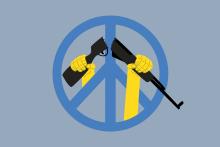
THE NUMBER OF asylum seekers from Russia arriving at the U.S. southern border has risen dramatically in the past year. Hundreds of thousands of Russians have left their homeland since President Putin ordered the invasion of Ukraine. Some fear increasing economic hardship and that Putin will impose martial law and close the borders, and some are fleeing to follow their conscience.
In September, the Kremlin announced its first military mobilization for soldiers to fight in Ukraine, prompting the departure of tens of thousands of Russian men. A second mobilization may occur this fall. Many of those who have fled hold religious or moral beliefs that tell them that participation in Russia’s invasion of Ukraine is wrong. Many young men have come to the United States seeking asylum as conscientious objectors (COs) based on their refusal to be drafted into Russia’s military for reasons of moral conscience.
At the Center on Conscience and War, we began hearing about these cases in fall 2022 — and found very few resources to support them. A handful of immigration attorneys are taking on a few of these cases, but the demand is much greater than the help available. This spring, our center initiated a Freedom of Information Act request to learn exactly how many of the asylum seekers are making claims based on conscientious objection to military conscription.

THIS JULY, THE United States turns 247 years old. Independence Day calls to mind a powerful narrative—our nation’s defiant break from the British Empire, explosive population growth and expansion, and ascent as a world power. Yet within this historical movement are rooted many other stories—large and small—that reflect who we really are as a nation. When we hold up a larger mirror, when we view ourselves more completely and take all these stories into account, then we recognize that “our” history is more than a collection of dates, events, and people prioritized by the powerful. History is a complex web of beliefs, practices, and interpretations that exist in the sacred movement of time and space as a spiraling mixture of who we are and who we are becoming.
Sharing a common understanding of history is complicated these days by new words in our lexicon like “fake news” and “alternative facts.” How do we know what to believe and what to reject? Isn’t “revisionist history” a bad thing?
In fact, many historians agree that allhistory is revisionist. Historical interpretation, by its very nature, changes with time and circumstance, requiring new views and fresh analyses. From one perspective, the revision of history in any form means to criticize the past and disrupt commonly held ideas and beliefs. Conversely, the introduction of new, validated, historical information broadens the scope of discourse and deepens its meaning in ways that bring clarity to the past and hope for the future.

THERE IS A DISTURBING sense of déjà vu in the Philippines. Thirty-seven years after the nonviolent People Power movement ended the brutal and kleptocratic 20-year reign of Ferdinand Marcos Sr., his only son and namesake sits comfortably in the presidential palace. Following in his father’s footsteps, President Ferdinand “Bongbong” Marcos Jr. is once again cozying up to the United States.
In 2012, the Obama administration began to “rebalance” U.S. military and trade agreements in Asia. Since 2014, the U.S. has had access to five military bases in the Philippines and trains Filipino soldiers under the Enhanced Defense Cooperation Agreement (EDCA) — all part of Obama’s “pivot to the Pacific.”
In February this year, Marcos agreed to allow the U.S. military to pre-position troops and weapons at another four bases. This gives the U.S. the largest military footprint it has had in the Philippines in 30 years, when a Filipino-led anti-colonial independence movement led to the removal of all permanent military bases in their country.
In its push to expand EDCA, the Biden administration said it would spend $82 million on projects at the first five bases. In addition, U.S. ambassador MaryKay Carlson announced $100 million in new foreign military financing for the Philippines “to use as it wishes.” The Philippines is already the largest recipient of U.S. military assistance in the region, receiving $1.14 billion in weapons and equipment since 2015. U.S. and Philippines government officials claim that the purpose of this growing U.S. military presence is to help with humanitarian crises and disaster relief, as well as to prepare for a future conflict with China, most likely over Taiwan.

IN LATE MARCH, when Far Right former Brazilian president Jair Bolsonaro returned from self-imposed exile, supporters greeted him with chants of “God, family, and liberty,” harkening back to the motto of the dictatorship that ruled Brazil from 1964 to 1985. Overwhelming political support from evangelical Christians — similar to that received by Donald Trump — had swept Bolsonaro into office in 2018. Both men repaid this support by moving their respective embassies from Tel Aviv to Jerusalem, actions that were long sought by conservative Christians in the West, signaling a rejection of Palestinian aspirations for independence.
Brazil is only one of the countries in Latin America where right-wing evangelical Christians have become a political force. Today, evangelicals constitute about 27 percent of Brazil’s population, compared to about 25 percent in the United States, according to the Pew Research Center. As the number of Latin American evangelicals has soared in recent years, Christian Zionism has also risen as a political and cultural force in the region.
Christian Zionists believe that support for the modern secular state of Israel is a scriptural obligation with theological ramifications for the “end times.” Too often Christian Zionists defend Israel while perpetuating Christian supremacy and antisemitism; they remain ignorant of the persecution of Jews throughout history. Adopting uncritical, religiously motivated support for the secular state of Israel, Christian Zionists provide cover for Israel’s internationally recognized human rights abuses against Palestinians. The embrace of Christian Zionism threatens to be as damaging to marginalized communities in Latin America as it has been to Palestinians.

CIVIL RIGHTS LEADER Ella Baker utilized the strength of her voice at the height of that movement to fundamentally question the notions and ideas of equality and leadership in this nation. In 1969, Baker said, “[T]he system under which we now exist has to be radically changed.” This means “facing a system that does not lend itself to your needs and devising means by which you change that system.”
Black women have long been considered the backbone for civil rights, social justice, church advancement, and animators of democracy in the United States. If this is so, then why are so many still overlooked for advancement in political power as well as the everyday jobs that they are more than qualified for?
While “women” won the right to vote in 1920, Black women fought for about another half century to exercise their right. The inequities of gender, race, and access are still with us — and there is no greater time than now to push hard for political and social advancement.
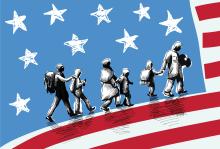
IN 2016, PEOPLE of faith in the city of Billings, Mont., gathered to call for their community to get more involved in resettling refugees. With growing violence, persecution, and strife around the world and a record number of people forced to flee their homes, this community had the heart to help.
But the closest refugee resettlement office in the state was in Missoula, a 345-mile road trip west on I-90. The United States traditionally requires refugees to be resettled with families and relatives or close to these resettlement sites, which help new arrivals land on their feet and access needed services. For Billings — and for many other like-minded communities across the country — it was a logistical challenge to participate in the work of welcome.
Earlier this year, that changed. On Jan. 19, the Biden administration launched Welcome Corps, a new initiative giving everyday Americans the opportunity to sponsor refugees. Groups of at least five can now apply to form “private sponsorship groups,” which are responsible for welcoming refugee newcomers into their communities. These groups agree to assist in providing initial housing; as well as support access to health care, school enrollment, and employment opportunities; and otherwise engage directly in the life-changing work of refugee resettlement.

THREE YEARS AGO, I joined a struggle for what I view as the most transformational justice reform today: change to the U.S. Constitution. The change I advocate is at once unbelievably simple and profoundly radical: for Americans to agree that all citizens enjoy equal rights under law, whatever their gender or sexual orientation. It’s time to recognize the Equal Rights Amendment. Equality is central to most contemporary theories of justice. A majority of Americans puzzle why our nation has failed to live up to the promise of equality in our democracy. So why aren’t women protected equally?
“The ERA is dead,” opponents argue, laid to rest by an arbitrary time limit that was negotiated into the prelude of the bill Congress passed in 1972. A procedural objection seems a weak theory to lead with, in response to the unrequited aspirations of half the citizenry for basic human rights. Whatever the amendment’s merits, many claim, it cannot be revived. And yet miraculously, it has been. And women everywhere are testifying to this resurrection.
This is fitting, isn’t it? It was women, after all, who first testified to the resurrection. This Easter, we read how Mary Magdalene and the other Mary meet an angel at Jesus’ tomb, who commissions them to tell the disciples he is risen. The guards are too terrified to move, but the women rush to fulfill their divine calling (see Matthew 28).

IF MARY AND JOSEPH were living in Missouri today and had to make their own shelter after the innkeepers turned them away, Jesus would be greeted by police officers instead of shepherds. Why? In January, Missouri initiated a new statewide law criminalizing homelessness. The law (and similar laws in several states) is based on template legislation from the Cicero Institute, a right-wing group that peddles legal schemes that limit effective solutions and strip support from people who can’t afford a place to live. If Moses and his tribe were wandering in Tennessee, a law that went into effect in July — supported by Cicero — allows for felony charges for pitching a tent on state-owned property.
Across the country, politicians are passing laws that penalize our neighbors who can’t afford a place to live and who must sleep, shelter, and conduct other life-sustaining activities in public. We have seen the results of those laws at the local level when city councils come up with ineffective — and plain bad — ideas to deal with homelessness. Now there is a well-funded, coordinated push to raise those bad ideas to the state level.

IN NOVEMBER, a stray missile from the Russia-Ukraine war landed in Poland, killing two men in their 60s who worked at a grain warehouse. It took several emergency meetings with NATO officials to determine whether Russia had intentionally escalated the war into the region of the Western military alliance. All parties deemed it an “accident.” (The missile came from Ukraine.)
What if that stray missile had a nuclear warhead?
Russian President Vladimir Putin’s threat to use nuclear weapons in Ukraine must be firmly condemned, as well as his cruel and illegal war with its continued escalation. But accidents happen. Even a limited or regional use of nuclear weapons could have planetary effects, blocking the sun enough to cause a global temperature drop, collapsing crop production, and resulting in massive starvation, according to a report by the International Physicians for the Prevention of Nuclear War.
As the Poland example shows, today we are facing the most serious nuclear threats since the Cuban missile crisis 60 years ago, which then-Secretary of Defense Robert McNamara said we survived only by luck.
Nuclear weapons raise biblical issues. The continuing survival of God’s creation and the human race cannot rely on just “luck” but instead needs providential intervention. A few weeks before the November missile crisis in Poland, Pope Francis said, “Today, in fact, something we dreaded and hoped never to hear of again is threatened outright: the use of atomic weapons, which even after Hiroshima and Nagasaki continued wrongly to be produced and tested.”
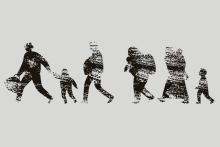
I KNEW ALMOST immediately it was bad news.
“Maria was separated at the border from her auntie,” my friend said in a phone call. “We don’t know where she is. Her auntie was sent back to Mexico and we think is being held by a drug cartel. They separated them under Title 42.”
I felt sick. Four-year-old Maria (not her real name) and her aunt were fleeing violent circumstances. They arrived at the U.S.-Mexico border to exercise their legal right — protected by both international and U.S. law — to request asylum, as other members of Maria’s family had done prior to the COVID-19 pandemic.
In March 2020, everything changed. The Trump administration, through the Centers for Disease Control and Prevention (CDC), invoked a rarely used subsection of public health code called Title 42 to close U.S. borders to asylum seekers and unaccompanied children under the guise of preventing the spread of COVID-19. It made that decision against the advice of many public health experts, including some within the CDC, who agreed there was no public health rationale for a ban on asylum seekers as a group. Though the border remained open to truckers, temporary workers, students, and others, border agents turned back asylum seekers to Mexico or their home country.

EARLY IN THE 2022 NFL season, I watched as the Miami Dolphins quarterback Tua Tagovailoa suffered a second head injury in the span of five days. Although the NFL would not admit the first of those was a concussion, it was painfully clear that Tagovailoa suffered serious brain trauma.
In that moment, I felt the culmination of years’ worth of fretting over the sport I loved and its relationship to head injuries. I determined then and there on a Thursday night that I would quit the NFL. Why? The NFL is violent — and Christians are called to peace.
The league is unrepentant and unaccountable in its abuse of the brains and bodies of its players, and no amount of reform can change that. I am convicted that if I am to love my neighbors — if I am to love God — then I must resist the NFL.

RISHI SUNAK'S ASCENSION in October as British prime minister sparked celebration among some as he became the United Kingdom’s first nonwhite and non-Christian leader. Yet, this evolution comes with some awkwardness. The Church of England is an “established” church in which both monarchy and government play official roles. Sunak’s religious identity remains irrelevant for leading Parliament, but his status as a practicing Hindu would seem to impinge on his ability to discern which Anglican priests are best suited for leadership roles within the church hierarchy.
Raising this concern is not an argument that all prime ministers must be Christian — the U.K. rightly has no religious test for the role, as Sunak’s elevation demonstrates. But his ascension reveals a problem with not fully separating church and state. The Church of England now finds itself with a non-Christian in the ecclesial hierarchy. The roles of the monarch and prime minister in church affairs are in modern times more ceremonial than substantive, but Sunak reveals the problem with the entanglement both in principle and in practice.